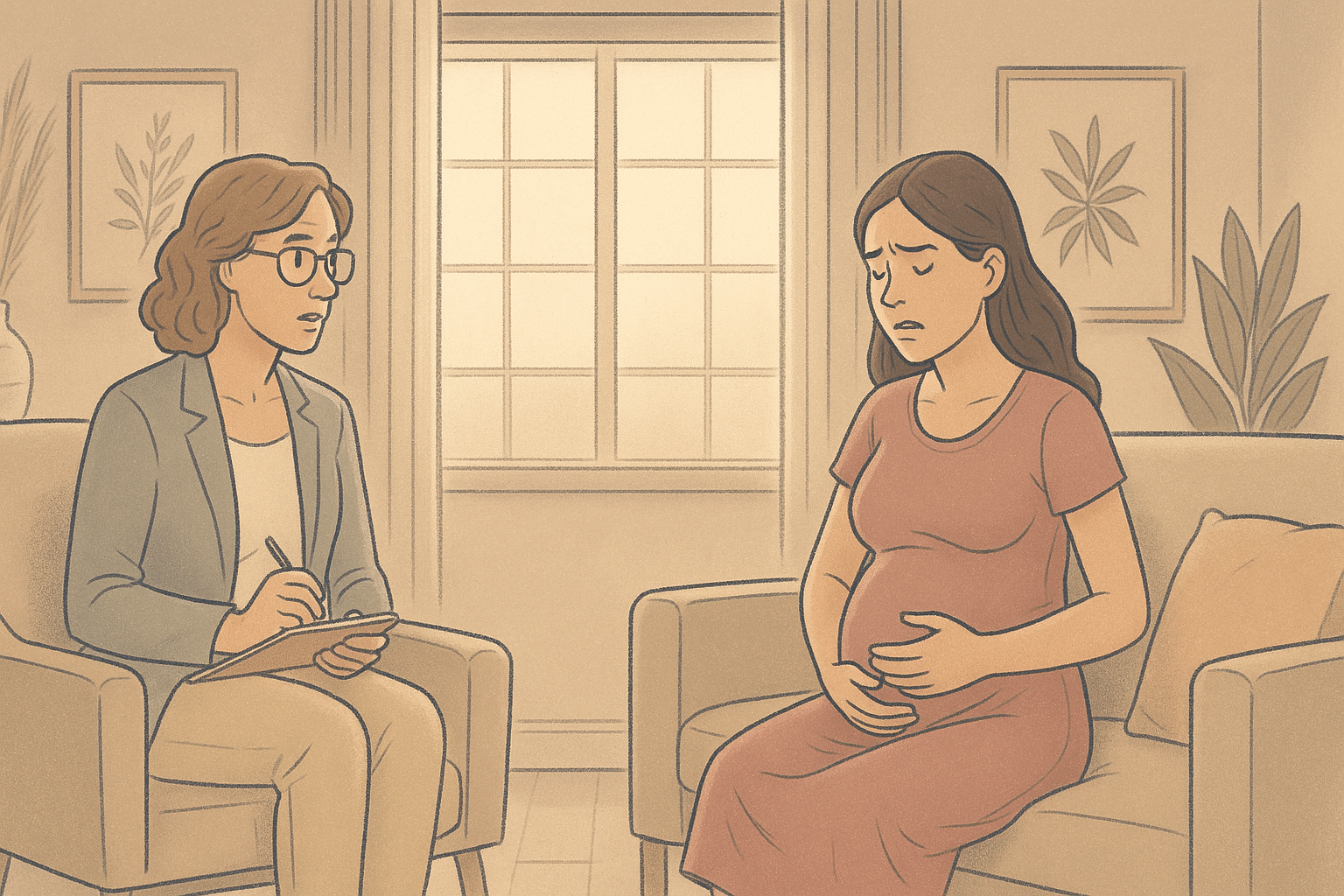Key Takeaways
- Panic attacks during pregnancy affect up to 10% of expecting mothers and are characterized by intense feelings of fear, racing heart, and shortness of breath.
- Hormonal changes, increased stress, and pregnancy-related health concerns can trigger new panic attacks or worsen existing anxiety disorders.
- Immediate relief techniques include deep breathing, grounding exercises, and cold water application that can be safely practiced during pregnancy.
- Professional support through therapy, potential medication, and creating a comprehensive birth plan can significantly reduce panic episodes during pregnancy.
- At A Mission for Michael, our clinical team offers comprehensive, individualized treatment plans specifically designed for expecting mothers, combining therapy, medication management when appropriate, and ongoing support throughout pregnancy and postpartum.
Panic Attacks and Pregnancy
Panic attacks during pregnancy often feel different from regular anxiety. They typically strike suddenly and intensely, creating a sense of immediate danger or doom. Your heart pounds, breathing becomes difficult, you might feel disconnected from reality, and you may even fear losing control. What makes pregnancy panic attacks particularly distressing is the added worry about how these episodes might affect your developing baby.
What Causes Pregnancy Panic
The physiological and psychological changes during pregnancy create a unique environment where panic attacks can develop. Hormonal fluctuations, particularly changes in estrogen and progesterone levels, directly affect your brain chemistry and can influence mood regulation.
Physical discomforts like morning sickness, fatigue, and shortness of breath (common in pregnancy) can mimic panic symptoms, sometimes triggering actual panic responses. Additionally, the natural concerns about your baby’s health, upcoming labor, and life changes create legitimate stressors that can manifest as anxiety and panic.
Pre-existing anxiety disorders often intensify during pregnancy, especially if you’ve discontinued medication due to pregnancy concerns. Environmental factors, including relationship challenges, financial concerns, and lack of support, further compound these biological vulnerabilities.
Symptoms During Pregnancy
Common symptoms of pregnancy panic attack include racing heart, chest tightness or pain, shortness of breath, dizziness or lightheadedness, nausea, trembling, sweating, feelings of choking, and fear of losing control. You might also experience depersonalization (feeling detached from yourself) or derealization (feeling like your surroundings aren’t real).
Unique to pregnancy, you might have intense fears specifically about harming your baby during the panic episode, misinterpreting normal pregnancy sensations as dangerous, or worrying that the stress will cause pregnancy complications.
Effects on Baby

One of the most common concerns among expectant mothers experiencing panic attacks is whether their anxiety will harm their baby.
Your body is designed to protect your baby even during stress, and the temporary nature of panic attacks means that your baby isn’t experiencing prolonged distress. However, research shows chronic, untreated anxiety that leads to persistent increased stress hormones may potentially affect pregnancy outcomes.
Severe anxiety during pregnancy has been associated with potential increased risks of preterm birth and lower birth weight in some cases. However, understand that these associations are complex and influenced by many factors including overall health, support systems, and genetic predispositions. The good news is that with proper treatment and management of panic and anxiety symptoms, these potential risks can be significantly reduced or eliminated.
Founded in 2010, A Mission For Michael (AMFM) offers specialized mental health care across California, Minnesota, and Virginia. Our accredited facilities provide residential and outpatient programs, utilizing evidence-based therapies such as CBT, DBT, and EMDR.
Our dedicated team of licensed professionals ensures every client receives the best care possible, supported by accreditation from The Joint Commission. We are committed to safety and personalized treatment plans.
Immediate Relief Techniques
Deep Breathing Methods

Deep breathing remains one of the most effective and accessible techniques for managing panic during pregnancy.
When you feel panic beginning, focus on taking slow, deep breaths through your nose, allowing your belly to expand fully, then exhale slowly through slightly pursed lips. This pattern activates your parasympathetic nervous system, your body’s natural calming mechanism. For pregnant women specifically, diaphragmatic breathing provides the added benefit of increasing oxygen flow to both you and your baby.
Try the 4-7-8 breathing technique: inhale for 4 counts, hold for 7 counts, and exhale for 8 counts. This structured breathing pattern gives your mind something concrete to focus on while naturally slowing your heart rate. Practice this technique daily when you’re calm, so it becomes automatic when panic strikes.
5-4-3-2-1 Grounding
The 5-4-3-2-1 grounding technique can effectively pull your mind away from spiraling panic thoughts by reconnecting you with your immediate environment. Start by identifying 5 things you can see around you, then 4 things you can touch or feel (like your baby bump or the texture of your clothing), 3 things you can hear, 2 things you can smell, and 1 thing you can taste. This exercise works by engaging all your senses, which redirects your brain’s attention away from panic signals.
During pregnancy, this technique can be especially meaningful when you incorporate awareness of your baby into the process. Feel your baby’s movements as one of your touch sensations, or include talking to your baby as one of your hearing elements. This grounds you and strengthens your prenatal bond.
Body Movement Strategies
During a panic attack, try progressive muscle relaxation by tensing and then releasing each muscle group from your toes up to your face. This technique works well during pregnancy as it doesn’t require changing positions and can be done sitting, standing, or lying on your side.
Another helpful approach is gentle stretching that’s appropriate for your stage of pregnancy. Simple neck rolls, shoulder circles, and wrist rotations can provide relief without putting strain on your changing body. Walking, if you’re able, can also be beneficial, even if it’s just around the room. The rhythmic movement helps regulate breathing and provides a physical outlet for the adrenaline surge that accompanies panic.
When to Seek Help
Warning Signs
Watch for panic attacks that occur multiple times per week, significantly interfere with daily activities, or cause you to avoid important prenatal appointments or social situations. Pay attention if you’re experiencing persistent sleep problems, excessive worry about your baby’s health despite medical reassurance, or intrusive thoughts about harm coming to you or your baby. The earlier you seek help for these concerns, the more effectively they can be managed during your pregnancy.
Emergency Situations
While panic attacks feel frightening, they rarely constitute medical emergencies. However, certain situations warrant immediate medical attention. Seek emergency care if you experience chest pain that radiates to your jaw, neck or arm, difficulty breathing that doesn’t improve with calming techniques, severe dizziness or fainting, vaginal bleeding, decreased fetal movement, severe headache, vision changes, or sudden swelling in your face or hands.
If you’re experiencing thoughts of harming yourself or persistent thoughts about ending your pregnancy, this also constitutes an emergency requiring immediate help. Remember, emergency professionals are trained to distinguish between panic symptoms and other medical conditions, and they can provide appropriate care for both you and your baby.
Medical Support Options for Anxiety
Safe Medications
Medication decisions during pregnancy require careful consideration of both the risks of untreated anxiety and the potential effects of medication on fetal development. Selective Serotonin Reuptake Inhibitors (SSRIs) like sertraline (Zoloft) and fluoxetine (Prozac) are generally considered among the safer options during pregnancy when medication is deemed necessary. These medications have been extensively studied in pregnant populations, with research showing minimal risks to developing babies when compared to the risks of untreated severe anxiety or depression.
Therapy Approaches

Therapy offers effective, medication-free approaches to managing panic during pregnancy.
Cognitive Behavioral Therapy (CBT) has strong evidence supporting its effectiveness for panic disorder during pregnancy. This structured approach helps you identify and challenge the thoughts that trigger panic while developing practical coping strategies. A skilled therapist can adapt CBT techniques specifically for pregnancy-related concerns.
Managing Pregnancy Panic with AMFM’s Expert Care
At AMFM, our comprehensive approach addresses both the immediate need for symptom relief and the underlying factors contributing to anxiety during pregnancy. Through evidence-based therapies like Cognitive Behavioral Therapy, mindfulness techniques, and carefully considered medication management when appropriate, we help expecting mothers develop the skills and confidence needed to manage panic effectively.

We provide a safe and caring environment for you to explore your feelings and get adequate treatment
Our clinical team understands the delicate balance between protecting your mental health and ensuring your baby’s wellbeing. We work collaboratively with your obstetric care providers to create integrated treatment plans that support you throughout pregnancy and into the postpartum period.
Don’t let panic attacks overshadow this precious time in your life, reach out to AMFM today to begin your journey toward calm, confident motherhood.
Frequently Asked Questions (FAQ)
Can panic attacks harm my baby?
Occasional panic attacks are very unlikely to cause harm to your developing baby. Your body is designed with protective mechanisms that prioritize your baby’s oxygen and nutrient supply, even during stress responses. The temporary nature of panic attacks means your baby isn’t exposed to prolonged stress hormones from a single episode. However, frequent, severe, untreated panic attacks that lead to chronic anxiety may potentially increase certain risks, which is why seeking appropriate treatment is important.
Should I stop taking anxiety medication during pregnancy?
The decision about anxiety medication during pregnancy should always be made in consultation with your healthcare providers, never independently. Abruptly stopping medication can trigger severe rebound anxiety that may pose greater risks than continuing treatment. Modern approaches to perinatal mental health focus on weighing the risks of untreated anxiety against the specific risks of medication.
How can I tell the difference between panic and pregnancy symptoms?
This distinction can be challenging as many physical symptoms overlap. Shortness of breath, heart palpitations, dizziness, and nausea can occur both in normal pregnancy and during panic attacks. The key differentiating factors typically include the pattern of onset, duration, and associated thoughts. Panic symptoms usually come on suddenly and intensely, peak within about 10 minutes, and are accompanied by catastrophic thoughts or a sense of doom. Pregnancy symptoms tend to develop more gradually, persist at a steady level, and aren’t typically accompanied by the same sense of immediate danger.
What should my partner do when I’m having a panic attack?
Partners can provide invaluable support during panic episodes by responding with calm, reassuring presence rather than alarm or frustration. The most helpful approach includes acknowledging your experience without judgment (“I can see you’re having a hard time right now, and that’s okay”), gentle reminders to breathe slowly, and perhaps guiding you through familiar grounding exercises. Physical comfort like hand-holding or back-rubbing can help if you find touch soothing during panic, but partners should respect boundaries if touch feels overwhelming.
How does AMFM specifically help pregnant women with panic attacks?
AMFM offers specialized perinatal mental health programs designed for expecting mothers experiencing panic attacks. Our approach includes pregnancy-safe Cognitive Behavioral Therapy, mindfulness techniques, and careful medication management when needed. We collaborate with obstetric providers to ensure integrated care that supports both maternal mental health and fetal wellbeing.
Our team provides continuity of care from pregnancy through postpartum, offering personalized treatment plans and ongoing support for lasting relief and confident motherhood.













